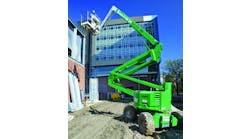Environmental clean-up applications and natural disasters don't happen on a schedule. But when they do, equipment is needed onsite immediately. The Deepwater Horizon explosion and subsequent oil spill that occurred in April off the coast of Louisiana in the Gulf of Mexico is one such example. While these events can never be planned for, rental companies can be prepared to offer equipment and support at a moment's notice when these disasters occur.
Following are examples of what a few rental companies are doing to capture business in the burgeoning environmental segment. While these examples range from providing equipment to aid in natural and not-so-natural disaster recovery to the growing wind power market, there are dozens of environmental applications that require equipment and tools including alternative energy applications such as wind farms, hydroelectric dam maintenance and ethanol plant construction. Other green applications include recycling and demolition waste centers, and geothermal temperature control systems.
As awareness grows in the public's consciousness of the importance of environmental sustainability, so, too, will state and federal regulations requiring rental companies and contractors to perform in a more environmentally conscious manner. With that will come more opportunities for rental industry growth. Is your business ready?
Kohler Rental
Kohler, Wis.
Application: Oiled Wildlife Rehabilitation Centers
Kohler Rental was recently called on to provide temporary power and air conditioning services to wildlife rehabilitation centers in several Gulf Coast states as a result of the Deepwater Horizon explosion and subsequent ongoing oil spill. The U.S. Fish & Wildlife Service established these temporary wildlife rehabilitation centers and housing areas for volunteers and workers in Theodore, Ala.; Pensacola, Fla.; Buras, La.; and Gulfport, Miss.
The Fort Jackson Oiled Wildlife Rehabilitation Center in Buras, La., is the epicenter of bird rescue and cleaning efforts in the coastal area south of New Orleans. In early June more than 600 oiled birds had been brought in to the bird-cleaning station there. Of that number, 200 were dead on arrival, and hundreds more would follow, requiring immediate care. Brown pelicans and other bird species affected by the oil flowing into the Gulf of Mexico have an extremely high survival rate if found and rescued in a timely manner.
As birds arrive at the wildlife rehabilitation triage center they are placed in a holding pen to de-stress for 24 hours. Then they are meticulously cleaned with household dishwashing detergent, rinsed, dried and placed in an area known as “Pelican Island” where they are kept for a recovery and observation period. Once the birds are cleared for release they are flown to either Florida or Texas where the threat of recontamination is much less.
To support the rescue operation Kohler Rental is onsite providing air conditioners and chillers from 20 to 110 tons, generator power to back-up the chillers from 20kW to 200kW, general power for yard-type applications and to power the equipment used to clean the birds, lighting, and pumps to help circulate the water in the bird holding pens on Pelican Island.
“It's a fairly overwhelming experience,” says Gary Davis, senior account manager for Kohler Rental Power. “I marvel at the individuals working through exhaustion to save these birds. The influx of animals to the rehabilitation camps is based on weather patterns and it gets very busy at times. The care that's being provided to treat these animals is truly inspiring.”
There is nothing traditional about the services and equipment that Kohler Rental is providing to these wildlife rehabilitation centers, Davis notes. Requests that the average customer would never make must be taken seriously and met to the most miniscule detail because the rescue of these birds is at stake. In this application, Kohler Rental is working to cool uninsulated buildings during the hottest summer months. The challenge is to keep the cleaning stations cool for the workers, but not make them intolerably cool for the oiled and sick birds.
“It comes down to experience, attitude and expertise,” explains Davis. “You need to have the equipment expertise and the attitude to go a little deeper. We're not just renting the assets, we're trying to understand the application and peel back the layers.
Rental Solutions
Eldersburg, Md.
Application: Food service and power equipment to Gulf Coast disaster relief workers
Rental Solutions, which provides a range of equipment and services including kitchen equipment, tenting, flooring, lighting, HVAC and power generation equipment, showers, restrooms, and heavy equipment, was recently called upon to aid Gulf Coast oil spill disaster relief workers. The company is providing food service and power generation equipment for tented kitchen “camps” that are serving food to relief workers dedicated to the oil spill clean-up efforts.
The equipment includes metro racking for dry storage, walk-in refrigerators and freezers, stainless-steel prep tables, hand sinks, basin sinks, hot water heaters, warming cabinets, Ansul suppression skids, double stack convection ovens and burners, 30- and 40-gallon tilt skillets, steamers, fryers, cable distribution and generator power. The company's service includes 24-hour site tech support during the duration of the rental/service contract.
Thomas Brown Sr. and his son, Thomas Brown Jr., former executives of SSES Rental Services, a division of Glenn Dale, Md.-based TVI Corp., started Rental Solutions in 2009. The father and son team have more than 50 years experience in the general rental and special event industries, including disaster response, having provided services to Florida Power & Light, Entergy and local utilities during the aftermath of Hurricane Katrina in 2005. “These relationships have provided us a strong base of customers and strategic partnerships within our new company,” says Brown Sr.
Rental Solutions' equipment is custom built for quick setup and takedown and the company is able to plan, design, install, manage and remove equipment from jobsites in a short amount of time, making it well-equipped to handle applications necessitated by environmental disasters such as the oil spill in the Gulf.
“The work we do during and after disasters is among the most important to us personally,” Brown Sr. says. “We have the equipment and personnel, and it's our privilege to be able to provide it when needed.”
Though the company has several divisions that includes a growing general rental segment, its most burgeoning market with opportunity for growth is its tented and mobile kitchen division, according to Brown. This division provides services throughout the U.S. with heavy saturation in Maryland, Washington D.C., Pennsylvania, Florida, Texas, Alabama and California.
“This diversification of our rental business helps insulate us from the peaks and valleys of the general rental industry,” Brown Sr. says.
Aggreko
Houston
Application: Hazardous and non-hazardous waste disposal and recycling
Aggreko, a global leader in rental power, temperature control and oil-free compressed air, recently signed a three-year agreement to be the preferred supplier to Norwell, Mass.-based Clean Harbors Environmental Services, including Clean Harbors Canada. Clean Harbors is the leading provider of environmental, energy, and industrial services, and is the largest hazardous waste disposal company in North America. It provides a range of hazardous and non-hazardous waste recycling, treatment and disposal services, as well as laboratory chemical packaging.
Aggreko and Clean Harbors began working together on a project-by-project basis in 2007, but the new three-year partnership calls for Aggreko to provide equipment and services at Clean Harbors' on-site facilities as well as in remote locations on projects dealing with hazardous waste spills or contamination. Aggreko primarily supplies Clean Harbors' on-site facilities with rental equipment for applications such as supplemental temperature control when needed for comfort cooling or process management. Additionally, Aggreko provides supplemental power generation during maintenance, outages or unplanned events, requiring the rental company to be prepared for anything.
“As part of the partnership, Clean Harbors' requirements and services are highlighted internally within Aggreko, raising awareness of how we can support all of their businesses,” says Joe Janney, business development manager, Aggreko North America. “A national pricing agreement, along with agreed terms and conditions, allows for quicker processing of orders and rapid deployment of equipment to serve their needs.”
The two companies recently cooperated on the two-month repair and restoration of Atlanta's R.M. Clayton Water Reclamation Center after the city's flooding in September 2009 swamped it with eight feet of water, and knocked it offline. Clean Harbors provided its expert waste-cleaning services, while Aggreko provided large-scale compressed air services as pumping stations were repaired.
The R.M. Clayton Water Reclamation Center, which provides wastewater treatment for a service area that encompasses the city of Atlanta and most of north DeKalb County, is designed to treat an average of 122 million gallons of wastewater per day for discharge into the Chattahoochee River under a National Pollutant Discharge Elimination System permit. The flooding caused the center to sustain more than $52 million in damages, including damage to the pumps and blowers used to agitate and treat sewage in 20 separate ponds.
Clean Harbors, which was hired by the City of Atlanta to begin clean-up of the center, approached Aggreko for a temporary solution while the plant worked on replacing the damaged equipment.
“Time and space were both critical elements in this crisis,” says Tim Heath, Southeast area sales manager, Aggreko North America. “A huge amount of equipment needed to be mobilized immediately and operating within days. Because of all of the other clean-up activities going on simultaneously at the center, there was very limited space around the center's pool with which to work and position the equipment. New headers and adapters needed to be fabricated to allow the Aggreko equipment to work efficiently within the center's existing infrastructure.”
Aggreko worked around the clock to install 42 diesel compressors, seven large generators, and other equipment that was pulled from its service centers in Louisiana, Texas and the Great Lakes. The equipment was placed around the perimeter of the plant to provide air to treat the ponds. Aggreko's temporary solution continued for five weeks until the dedicated equipment at the R.M. Clayton Water Reclamation Center could be replaced.
“Through years of experience, the teams at Aggreko and Clean Harbors have developed a strong working relationship,” adds Heath. “Aggreko's national presence, industry-leading level of service and quick response matches Clean Harbors' exacting requirements when called upon for hazardous waste issues.”
RSC Equipment Rental
Scottsdale, Ariz.
Application: Wind farm construction and maintenance
RSC Equipment Rental has established itself as an industry leader in its internal environmental initiatives, including companywide recycling programs, a new equipment emissions tracking system, a waste-oil recycling program, and an equipment refurbishment program, just to name a few. But the company is actively pursuing new business initiatives in the green industrial segment as well, with equipment on site at wind farms in Texas and Canada.
The company has provided equipment to one of the largest wind farms in the world, the Horse Hollow Wind Energy Center, which has 421 wind turbines spread across 47,000 acres of land in Taylor and Nolan Counties in Texas. The turbines generate a total capacity of 735 megawatts — enough power to supply electricity to a half million homes. RSC Equipment's branch in Abilene, Texas, provided 22, 10,000-pound reach forklifts for the erection of the farm, which was completed in three phases. The company is currently working on two large wind farm construction projects in Alberta, Canada.
“We've been involved for the past eight years both in the construction and maintenance phases of wind farm projects,” says Brent Brown, RSC outside sales representative in Lethbridge, Alberta. “We're generally a first call because of our experience and our service, and they know we'll bend over backwards for them.”
In fact, bending over backwards is often a necessity because of the specific jobsite requirements on wind projects. RSC created a sales guide to working with wind farms that it distributes to outside sales reps who call on these customers. The guide provides background on wind power including details on how wind power is converted to electricity by the turbine, and what type of contractors work on these projects at each phase of construction and maintenance. The guide also outlines details sales reps need to know to provide the best service to customers on wind jobsites such as the necessity to anticipate bad weather.
Construction work on wind turbines must occur when there is no wind, making the window of opportunity for certain phases of construction very tight. In addition, before a wind turbine can be erected, a 20 to 30-foot hole must be dug to set the turbine's tower. These holes can quickly fill up with water in a heavy rain, making pumps a sudden necessity. A rental equipment provider that anticipates this need sets itself apart from competitors in the market.
Service is a key for most of the larger wind energy contractors when choosing a rental partner, RSC Equipment says. In addition, wind farm principles are looking to partner with vendors who embrace sustainability and have established their own initiatives. Because wind power is a renewable energy resource, wind power customers are conscious of the environment around them, including the wildlife habitat, erosion control and noise pollution.
“From a company standpoint I think it's important that we care about the environment and the communities that the wind farms are going into,” says Brown. “RSC takes a lot of pride in the fact that we are a leader in the industry in the green segment. It just shows our responsibility, I believe. I think it's everyone's responsibility.”
Spider
Tukwila, Wash.
Application: Wind turbine erection and maintenance
Spider, a division of Safeworks, continues its push into the wind turbine market, working on wind farms globally to provide its expertise and custom solutions. Spider also offers hands-on training in the field and in classrooms with curriculum specialized to wind farm technicians. The company has a range of solutions for wind turbine blade access that put workers on the blade surfaces for the full range of work that must be performed at height, including blade inspection and repair from such events as lighting strikes, bird strikes, de-lamination and wear.
Spider also provides expertly rigged platforms and platform operators for maintenance work on turbine towers such as painting, clean-up of grease spills and routine cleaning.
“The growth of wind energy in North America is huge, with the biggest growth in Texas, the plains states and the Northwest,” says Liz Callahan, vice president of marketing, SafeWorks, parent company of Spider Staging, Power Climber and Power Climber Wind.
“There are a lot of new opportunities, but also new customer requirements in these environmental-type applications — it's not for the faint of heart,” says Callahan. “We approach these customers a bit differently. They're very risk-focused and they value strong engineering solutions and practical safety training and products. They differentiate suppliers quickly on expertise and reliability.”
Many of these environmental applications have site safety requirements well beyond what most rental companies are used to dealing with among their residential and commercial construction contractor customers. And customers on environmental projects such as wind farms have stronger controls in place for risk management than with many general construction projects, Callahan warns. “You need to know what you're getting yourself into and you need to prepare for it.”
While Spider continues to provide equipment for hire on wind energy projects, the company created its Power Climber Wind division, which is dedicated specifically to help major wind turbine OEMs, owners and service providers manage their operation and maintenance costs by leveraging the company's access equipment and expertise. Power Climber Wind is currently working on the second phase of BP Wind Energy's Fowler Ridge Wind Farm in Benton County, Ind., which is visible from several highways in the community.
As these farms start to get closer and closer to high-density population areas, maintenance work will be an ongoing necessity, Callahan says. Much like natural and environmental disasters that can and will strike at any time, wind energy and other environmental-related applications are another certainty in a market segment that has steadily grown in the past decade and shows no sign of dying down.
If your company is involved with an interesting, inspiring or unusual environmental application, we'd love to hear from you. Contact RER managing editor Brandey Smith at [email protected].





